UnMute Yourself: Musings on the Obstacles of Worship’s Impact on Ethics
IF 0.3
0 RELIGION
引用次数: 0
Abstract
While studying for my Master of Divinity, one of the concepts that drew me to the field of liturgical studies was the idea that what we did in worship shaped our ethical lives. I wrote my master’s thesis on how the storied nature of the liturgy should help insert us into the story of God, and I relied heavily on the virtue ethics approach promoted by thinkers like Don Saliers, Alasdair MacIntyre, Sam Wells, and Stanley Hauerwas (among others). With the zeal of a new convert, I believed if we could just get our liturgies right (whatever that means!), we could and would fundamentally change the foundational narrative out of which worshipers make their day-to-day ethical decisions as humans. While I still believe there is a strong connection between liturgy and ethics and find the work of these thinkers invaluable, the last decade of divisions and destructive behaviors in our churches and nation have tempered my initial enthusiasm. I have both grown more suspicious of any simple one-to-one correspondences I formerly drew between the way we worship and the way we live our lives, and I have lost the convert’s enthusiasm that believed if we just crafted historically grounded and theologically rich liturgies, they would somehow work ex opere operato (in the simplistic and corrupted sense of the phrase) on the ethical lives of the worshiper. It now seems much more complicated than that. So, I want to use this edition of “Unmute Yourself” not to propose a bold new theological or liturgical framework, but to suggest, with the help of various thinkers, what I believe are a few of the obstacles that limit the ethical impact of the liturgy on the average worshiper. First, some necessary caveats. Save a time machine in which you could make the same congregation the control group and the experimental group, there is no way to prove the ethical impact of worship. Thus, even liturgies that appear to the outside observer ineffectual in shaping the ethical lives of the average congregant may very well be forming the worshiper on a deeper level than our superficial observations can register. In a similar vein, the Spirit of God is not limited by the forms of our worship. God’s Spirit has, is, and will continue to draw people to the life of Christian discipleship through even the most shoddy and ill-performed liturgies, if only to remind the liturgist that worship is first and foremost an intrinsic good rather than an instrumental one used to shape the ethics of our congregation. We do not worship to create good people; we worship to glorify the God who is worthy of worship. So, the obstacles that I suggest may inhibit the ethical impact of worship might be analogous to the way the Roman Catholic Church describes the grace conferred through the sacraments: validly performed sacraments will always confer grace because they are the gift of God (the true meaning of ex opere operato), but we can place obstacles between ourselves and the grace conferred that limit their efficaciousness on our lives. In the same way, I suggest解除沉默:宗教信仰对伦理影响的障碍
在攻读神学硕士期间,吸引我进入礼拜研究领域的一个概念是,我们在礼拜中所做的事情塑造了我们的道德生活。我写了一篇硕士论文,探讨礼拜仪式的传奇性质应该如何帮助我们融入上帝的故事,我在很大程度上依赖于唐·萨利尔斯、阿拉斯代尔·麦金太尔、萨姆·威尔斯和斯坦利·豪尔瓦斯等思想家倡导的美德伦理方法。带着一个新皈依者的热情,我相信,如果我们能把礼拜仪式做好(不管这意味着什么!),我们就能也会从根本上改变崇拜者作为人类日常道德决策的基本叙事。虽然我仍然相信礼拜仪式和伦理之间有着密切的联系,并发现这些思想家的工作是宝贵的,但过去十年我们教会和国家的分裂和破坏性行为削弱了我最初的热情。我俩都越来越怀疑我以前在我们的崇拜方式和我们的生活方式之间建立的任何简单的一对一的对应关系,我也失去了皈依者的热情,他们认为如果我们只是精心制作历史性的、神学丰富的礼拜仪式,他们会以某种方式对崇拜者的道德生活进行操作(在这个短语的简单化和腐败的意义上)。现在看来,情况要复杂得多。因此,我想用这一版本的《Unmute Yourself》,不是为了提出一个大胆的新神学或礼拜仪式框架,而是在各种思想家的帮助下,提出我认为限制礼拜仪式对普通礼拜者道德影响的一些障碍。首先,一些必要的注意事项。省去一台时间机器,让同一个会众成为对照组和实验组,就没有办法证明崇拜的伦理影响。因此,即使是在外部观察者看来对塑造普通会众的道德生活无效的礼拜仪式,也很可能在比我们肤浅的观察所能记录的更深层次上形成崇拜者。同样,神的灵不受我们崇拜形式的限制。上帝的精神已经、现在和将来都会通过最低劣和最糟糕的礼拜仪式来吸引人们进入基督教门徒的生活,哪怕只是为了提醒礼拜者,崇拜首先是一种内在的善,而不是用来塑造我们会众道德的工具。我们崇拜不是为了创造好人;我们崇拜是为了荣耀值得崇拜的上帝。因此,我认为可能阻碍礼拜道德影响的障碍可能类似于罗马天主教会描述通过圣礼授予的恩典的方式:有效执行的圣礼总是会授予恩典,因为它们是上帝的礼物(ex-opere operato的真正含义),但我们可以在自己和所赋予的恩典之间设置障碍,限制它们对我们生活的影响。同样,我建议
本文章由计算机程序翻译,如有差异,请以英文原文为准。
求助全文
约1分钟内获得全文
求助全文

 求助内容:
求助内容: 应助结果提醒方式:
应助结果提醒方式:


